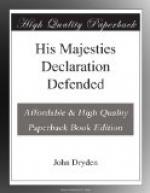and defence; even that neither will look but a squint
upon Religion; for a man of any Religion, and a man
of no Religion, are equally bound to preserve their
lives. But I answer positively to what he would
be at; that the Law of self-preservation impowers
not a Subject to rise in Arms against his Soveraign,
of another Religion, upon supposition of what he may
do in his prejudice hereafter: for, since it
is impossible that a moral certainty should be made
out of a future contingency, and consequently, that
the Soveraign may not extend his Power to the prejudice
of any mans Liberty or Religion: The probability
(which is the worst that they can put it) is not enough
to absolve a Subject who rises in Arms, from Rebellion,
in foro Conscientiae. We read of a divine
Command to obey Superior Powers: and the Duke
will lawfully be such, no Bill of Exclusion having
past against him in his Brother’s life:
Besides this, we have the Examples of Primitive Christians,
even under Heathen Emperors, always suffering, yet
never taking up Arms, during ten Persecutions.
But we have no Text, no Primitive Example encouraging
us to rebel against a Christian Prince, tho of a different
Perswasion. And to say there were then no Christian
Princes when the New Testament was written, will avail
our Author little; for the Argument is a
Fortiori:
if it be unlawful to rebel against a Heathen Emperor,
then much more against a Christian King. The
Corollary is this, and every unbiassed sober man will
subscribe to it, that since we cannot pry into the
secret Decrees of God, for the knowledge of future
Events, we ought to rely upon his Providence, for
the Succession; without either plunging our present
King into necessities, for what may never happen;
or refusing our obedience to one hereafter, who in
the course of nature may succeed him. One, who
if he had the will, could never have the power to
settle Popery in
England, or to bring in Arbitrary
Government.
But the Monarchy will not be destroyed, and the
Protestant Religion will be preserved, if we may have
a Protestant Successor.
If his party had thought, that this had been a true
Expedient, I am confident it had been mentioned in
the last Parliament at Westminster. But
there, altum silentium not one word of it.
Was it because the Machine was not then in readiness
to move! and that the Exclusion must first pass? or
more truly was it ever intended to be urged? I
am not ashamed to say, that I particularly honour
the Duke of Monmouth: but whether his
nomination to succeed, would, at the bottom be pleasing
to the Heads of his Cabal, I somewhat doubt.
To keep him fast to them by some remote hopes of it,
may be no ill Policy. To have him in a readiness
to head an Army, in case it should please God the King
should die before the Duke, is the design; and then
perhaps he has reason to expect more from a Chance
Game, than from the real desires of his party to exalt




